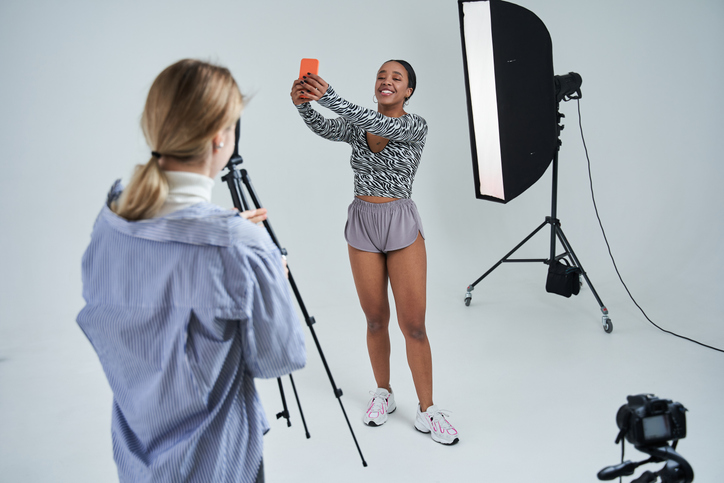
Source: YakobchukOlena / Getty
Companies like Levi’s, Urban Outfitters, H&M and Dove made offensive mistakes during attempts at diversity and inclusion over the last two decades. These incidents cost them customers and were a valuable lesson to other brands.
Nielsen reports that 59 percent of Black shoppers want to buy from brands representing their culture. However, the mad dash to win Black consumers has led to some incidents that were shamefully insensitive and, at times, blatantly racist.
Levi’s recent announcement that they’ll be using AI-designed models to “supplement human models, increasing the number and diversity of our models” was not met with the enthusiasm they’d hoped. Efosa Uwubamwen, a Black London-based model, explained to Insider, “The reason why diversity is such an issue in the industry at the moment is the same problem that Levi’s is recreating, which is that people of color don’t get as many bookings or don’t get requested nearly as much as white models.”
Levi’s released an updated press release, claiming that their use of AI-created models is not meant to be a part of their inclusivity initiatives. However, their original statement directly stated the tactic is partly aimed at boosting diversity.
Levi’s is not the first brand to put Black models or culture more front and center without making an in-depth assessment of their messaging in advance. In 2018, H&M mishandled diversity in a way that shocked customers. The Swedish clothing company ran an ad featuring a Black boy wearing a hoodie with the words “Coolest Monkey In The Jungle” written across the front. The ad was met with tremendous backlash due to its profoundly problematic comparison of a Black person to a monkey – a behavior that’s shown up in bigotry throughout history. The offensiveness of the ad was magnified by the fact that the white model for the complimentary product wore a hoodie with the words “Official survival expert.”
. @hm, have you lost your damned minds?!?!?! pic.twitter.com/EYuCXLZtv3
— Charles M. Blow (@CharlesMBlow) January 8, 2018
One IG user with the handle siaah.c wrote, “LOOK AT HOW MANY EYES THIS WENT PAST BEFORE IT WAS POSTED. Nobody cared to stop it.”
Another user with the handle @thattwinbp wrote, “It’s not all good. Hire an executive with common sense, please!”
H&M issued an apology that was not entirely accepted by its customers.
IG user @thattwinbp’s advice for H&M rang true for many again, following a Dove Facebook ad that ran in 2017. The campaign showed a Black woman who had presumably just used the bottle of Dove product sitting in front of her, removing her shirt to reveal a white woman underneath.
Author and historian Habeeb Akande Tweeted about the ad, remarking, “The advert insinuates that white skin/people are clean and pure, which black people can achieve after using the #Dove lotion.”
Dove apologised for ‘racist’ Facebook advert showing a black woman turning white after using @Dove lotion. pic.twitter.com/NGXyhnGuBZ
— Habeeb Akande (@Habeeb_Akande) October 8, 2017
Hundreds of commenters made their opinions about the ad known. Several expressed surprise that the ad went through a whole vetting process without someone speaking up.
One Twitter user with the handle @KatyDevine 1 wrote, “This is what happens when decisions are made in silos.”
Another posted a vintage soap ad showing a Black man washing his hands and his skin turning white, underscoring just how archaic Dove’s insensitivity was, even if the intention was inclusion.
In 2010, Urban Outfitters demonstrated the need for culturally aware eyes on every step of the marketing process, from design to sales, with their “Obama/Black” t-shirt incident. The trendy company listed “Obama/Black” as a color option in their website’s drop-down menu for a t-shirt. Urban Outfitters explained it was a website error, linked to “an internally developed color we called ‘Obama Blue’ and the other is ‘Black.’ Unfortunately, our website database truncated this combination to read ‘Obama/Black.’ We should have caught the error and apologize for offending anyone.”
These failed attempts at inclusion highlight the need for companies to give more profound thought to how they incorporate diversity into their work.



